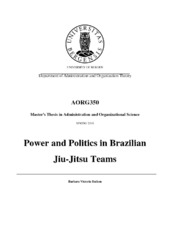| dc.description.abstract | Inspired by a debate in the BJJ community on BJJ politics" and the BJJ Globetrotters' goal of being politics-free", I wanted to find out if they truly were free of politics. As I understand the term, BJJ politics are the illegitimate regulation of practitioners' behaviour to the gain of the teams. As I did not want to get involved with the subjectivity of what is legitimate or not, I formulated my research question to: how different BJJ teams steer the behaviour of their members. The teams chosen for the study were chosen due to their image and position in the BJJ community. They were divided into two categories; the alternative team category, and the traditional teams category. Guided by my insights into the empirical field and the theoretical framework I developed eight hypotheses that suggested my expectations for what I would find. These hypotheses where tested through an online survey of practitioners of the teams and a document analysis of documents published by the teams. The findings have been analysed using the three dimensions of power of Dahl, Bachrach & Baratz, and Lukes. In the analysis I have focussed on the topics hierarchy, isolation, and formalisation, and how the values of and in the teams coincide with these three topics. I have found that the traditional teams use all three dimensions of power actively to uphold a strong hierarchy in the teams, they are formalised, and isolate their members from other teams to a small degree. The values of the team and their members overlap to strengthen these aspects. The alternative team, on the other hand, does not isolate its members from other teams, and has formalised very few relations. The dimension used the most is the 3rd, the values of the team call for an egalitarian structure, but its members support a hierarchy. The team can thus not be said to steer their members, although it seeks to. | en_US |
